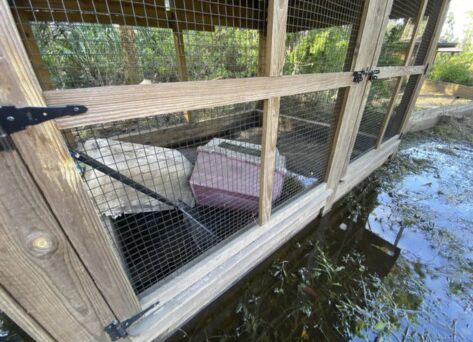
The last semester of graduate school is usually challenging for students, but imagine combining that with a Category 4 hurricane and putting your training into practice soon after! Fall 2022 certainly has been eventful for Ashleigh Rankin, who is completing her Master of Science in Shelter Medicine. When Hurricane Ian lashed southwest Florida on September 28, it brought powerful winds and storm surges, causing a massive evacuation of the coastal region. Many people were unable to bring their family pets with them as they evacuated, and the damage has left several communities inaccessible for returning residents. In preparation before and after the storm, Ashleigh used her skills to help local animals.
As with other students, she is required to prepare a Capstone Project in her final semester. Ashleigh based her project on creating a pet food bank distribution center in her local area of Punta Gorda, located in southwest Florida. That project quickly became more important than how it would be graded, as hurricane recovery efforts in the region required her idea to be utilized immediately.
“Many pet stores are still closed, so we are just using stockpiled food,” Ashleigh says. “I’ve been trying to coordinate and network with pet parents in need, so we can set out necessary supplies. Many areas are impassible, so even if stores were open, it would be difficult for residents to access pet supplies. We have been making emergency supply drops around the area in donation bins.”
She started collaborating with the local organization, Rescue Garage, to aid in searching for abandoned and lost pets, contacting owners, feeding and providing water to animals in need and documenting damage to residences and animal care facilities.










“There were multiple requests from pet owners who evacuated to go and check on their furry companions,” she notes. “We tried to leave as much food and water as possible, as well as clean up the area so it is as safe as possible for the pets, by removing broken glass, closing open windows and removing moldy carpet.”
To assure the pet’s safety, her team sometimes has to coordinate with owners to relocate the animals as living conditions deteriorated from flooding and exposure to the elements.
“One family evacuated to Nebraska and left their two cats,” she recounts. “We are transferring them to Animal Control care, per the owners’ wishes and consent, as the house is unlivable for both humans and animals. We film as much as possible to show the owners the damage and proof of animal life.”
Efforts are not solely focused on family pets. There has been active engagement with animal sanctuaries to provide agricultural supplies of feed, water, ice and gas. One local facility was badly damaged and suffered the loss of several goats and pigs. Ashleigh’s team surveyed the grounds and covered deceased animals until removal services can come out with the needed heavy equipment.
“We try our best to preserve the animal’s dignity with what resources we have.”
Her work demonstrates the core purpose of the Online Shelter Medicine Graduate Program to respond to the needs of vulnerable animals in communities.
“Ashleigh is truly doing the hero’s work,” says Program Director Dr. Terry Spencer. “She is helping so much in extreme circumstances. Plus, she is committed to finishing her degree, submitting her assignments without power or reliable internet resources. I am so proud of how she represents shelter medicine.”
If you would like to help the rescue and relief efforts, you can find out more about Rescue Garage at their website, https://www.rescuegarage.org/.

